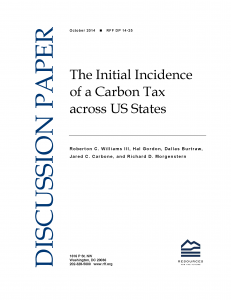Land Conservation and Sea Level Rise—Florida Edition
If you’re a fan of crime fiction with a dash of humor, you might have read some of Carl Hiaasen’s books—Skinny Dip, Nature Girl, Paradise Screwed, to name three. If so, you’ve probably noticed Hiaasen’s love of nature, specifically the wild and woolly swamps and back woods of south Florida. In early November, Hiaasen wrote […]
Alternative Compliance Payments under the Clean Power Plan
This is the ninth in a series of questions that highlights RFF’s Expert Forum on EPA’s Clean Power Plan. Readers are invited to submit their own comments to the questions and/or the responses using the “Leave a Comment” box below. See all of the questions to date here. RFF asks the experts: Could an alternative compliance payment […]
US-China Agreement: Benefits of Modest Non-Binding Deal may be Mainly Political
A lot has been written about the new climate agreement between the US and China made at the APEC summit this week. Almost all of it is very positive, framing the agreement as a major policy breakthrough with big impacts on both international climate negotiations and on the climate change problem itself. I confess I’m […]
Resources Magazine: What Americans Think About Climate Change
By Jon A. Krosnick, Nuri Kim, and Bo MacInnis. Polling Americans about climate change reveals a largely united desire for government action—and other surprises. On many issues, public opinion is so evenly divided that it does not provide a clear signal to government—but that’s not true on the issue of climate change. During the past […]
Cap and Trade in China: How Might It Work?
China plans to start a nationwide cap-and-trade market in 2016. But can China, whose economy still contains many nonmarket features, properly design and implement a fundamentally market-based policy? In our new RFF discussion paper, my coauthors (RFF’s Richard Morgenstern, Zhongmin Wang, and Xu Liu) and I attempt to answer this question by examining cap-and-trade pilot […]
Looking at the Effects of a Carbon Tax across States

The use of revenue from a carbon tax or cap-and-trade program substantially affects who gains and who loses as a result of the policy; indeed, it is often more important than the effect of the carbon tax itself. In a previous RFF discussion paper, we (together with RFF’s Dallas Burtraw and Richard Morgenstern, and Jared […]
More Natural Gas, Less Warming?
The unexpected energy revolution caused by the rapid growth in North American shale gas production has produced benefits related to the economy, jobs, energy security, and local air pollution, and has contributed to a decrease in US greenhouse gas emissions. However, as my colleagues and I report in a new study published online today by Nature Advance […]
Climate Change Policy Imperatives: Let’s Not Neglect Adaptation
Each succeeding year in which the world fails to agree to forceful and binding commitments to slash releases of greenhouse gas emissions underscores the increased urgency of complementary measures to strengthen resilience to impacts of global warming that may no longer be avoided or sufficiently mitigated through just emissions reduction. Framing that dilemma in shorthand […]
How US Gridlock May Handicap Climate Leadership
Next week, world leaders will meet at the United Nations in New York City at the invitation of UN Secretary-General Ban Ki-moon. The purpose of the meeting is to discuss actions the leaders will take to limit their country’s emissions of greenhouse gases in an effort to forestall global climate change. For many, success of […]
Pursuing a Global Climate Treaty: Next Stop, New York
Climate change takes center stage in New York City two weeks from now when world leaders will attend the United Nations Climate Summit—a stepping stone along the path to a new global climate agreement to emerge in Paris in late 2015. Don’t expect a “kumbaya” moment at the summit. Rather, expect to see a very […]

 Subscribe; to our RSS Feed
Subscribe; to our RSS Feed Tweets by @RFF_org
Tweets by @RFF_org 
Recent Comments